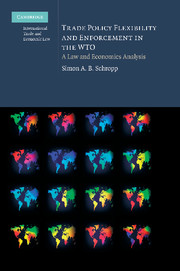Book contents
- Frontmatter
- Contents
- List of figures
- List of abbreviations
- Acknowledgements
- Foreword
- 1 Introduction: trade policy flexibility in the WTO – vice or virtue?
- PART I An introduction to incomplete contracting
- PART II Theorizing about the WTO as an incomplete contract
- PART III Flexibility and enforcement in the WTO: towards an agenda for reform
- 6 Theorizing about the WTO as an efficient “breach” contract
- 7 Towards an efficient “breach” contract: an agenda for reform
- Bibliography
- Index
6 - Theorizing about the WTO as an efficient “breach” contract
Published online by Cambridge University Press: 05 May 2010
- Frontmatter
- Contents
- List of figures
- List of abbreviations
- Acknowledgements
- Foreword
- 1 Introduction: trade policy flexibility in the WTO – vice or virtue?
- PART I An introduction to incomplete contracting
- PART II Theorizing about the WTO as an incomplete contract
- PART III Flexibility and enforcement in the WTO: towards an agenda for reform
- 6 Theorizing about the WTO as an efficient “breach” contract
- 7 Towards an efficient “breach” contract: an agenda for reform
- Bibliography
- Index
Summary
Seen from a contract-theoretical point of view, the current-day system of entitlement protection, trade policy flexibility, and enforcement in the WTO gives reason for concern. Currently, whenever an unforeseen (and hence unspecified) state of nature occurs, injuring WTO Members can choose between several substitutive (formal and informal) trade policy flexibility mechanisms, all of which are systematically undercompensatory. This results in (opportunistic) over-“breach” ex post, and undercommitment ex ante. The harm to the international trading system as a whole can be assumed to be significant. Economically weak players especially mistrust the contractual regime. This renders the global trading system dynamically unstable and underperforming.
Finding viable improvements and proposing sustainable reform avenues is imperative. Yet in order to make a meaningful contribution, it seems important that any proposal for reform is directed towards what is achievable, not just what seems desirable. Many reform proposals currently circulating in WTO scholarship are under a “prescriptive fallacy” (Dunoff and Trachtman 1999, p. 3): authors base their suggestions on what they take to be right, fair, legal, distributively just, globally efficient, or morally apposite. These are often intelligent, convincing, laudable, and well-intentioned endeavors. However, they display one crucial error in their reasoning – they are not incentive compatible with what decision-makers desire. One cannot expect self-interested actors to agree to treaty details that are not conducive to their utility improvement, let alone reforms which might eventually harm them.
- Type
- Chapter
- Information
- Trade Policy Flexibility and Enforcement in the WTOA Law and Economics Analysis, pp. 257 - 307Publisher: Cambridge University PressPrint publication year: 2009

